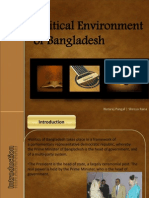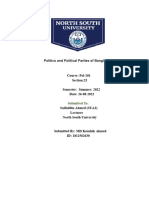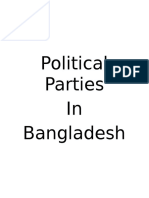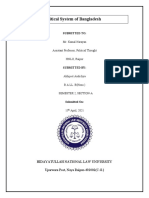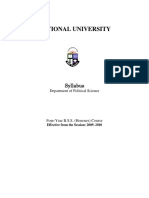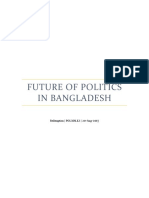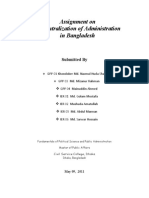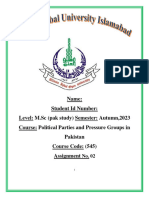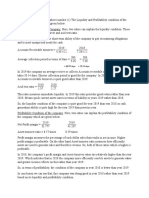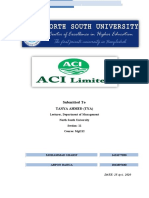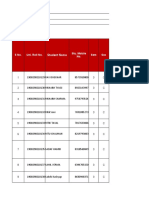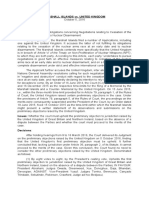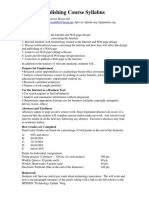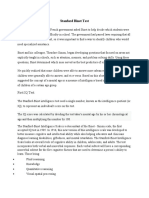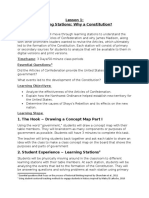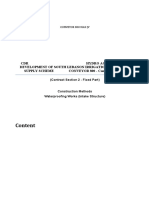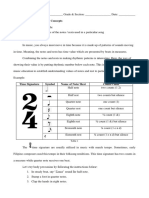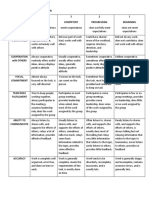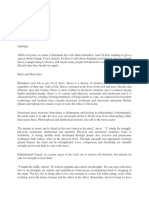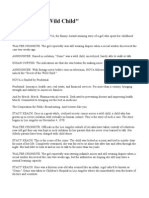Submitted To
Md. Saidur Rahman (SR3)
Lecturer, Department of Political Science and Sociology
North South University
Section: 19
Course: pol101
NO NAME ID#
01 ARPON BARUA 1821897630
RAKIBUL AHMED
02 1821857645
ANIK
03 MUSTAFA-E TASEEN 2014259630
DATE: 29 April. 2020
Page | 1
� Letter of Transmittal
29 April. 2020
To
Md. Saidur Rahman
Lecturer, Department of Political Science and Sociology
North South University
Subject: submission of report on “Political Parties in Bangladesh”.
Dear Sir,
It is our great pleasure to inform you that we have been successful to complete our assigned
group assignment. We tried heart and soul to bring forth a perfect assignment with our best
possible effort.
We pray and hope sincerely that we were able to meet the requirements to finish this assignment.
We will always be around and will gladly offer all information if needed.
Sincerely,
ARPON BARUA
RAKIBUL AHMED ANIK
MUSTAFA-E TASEEN
Page | 2
� Acknowledgement
In the name of Allah, the most Gracious and the most Merciful we can state that we have
finally been able to draw a conclusion to the assigned assignment, which was to “Political parties
in Bangladesh”. Every one of us would like to express our heartiest gratitude and recognition to
our respectable lecturer, Md. Saidur Rahman (SR3) who gave his all for us to get a clear
understanding of our course and which will hopefully reflect on this assignment, he gave us the
chance to work on and we cannot thank him enough for the extensive guiding and mentoring that
he has provided us throughout entire course which will surely help us all in paving the way for
our degree to complete our Bachelors in Business Administration..
Page | 3
� TABLE OF CONTENT
BACKGROUND....................................................................................................................1
THEROTICAL EXPLANATION................................................................................................2
REFLECTIONS......................................................................................................................3
REFERENCE…………………………………………………………………………………………………………………….4
Page | 4
� Background
In this very first stage we will know what is political parties, their function, importance and the
political parts of Bangladesh. Now let’s know the political parties. A political party is an
organization group of people or institution who have the same ideology, or who otherwise have
the same political positions. And who field candidates for elections is attempt to get them elected
and thereby implemented the party agenda.
In a final analysis of a state, it’s a unique setup of many diversified institutions and upon political
parties stand in the central to them. The political parties supply all political functions in a country’s
politics. Political candies link the citizens with the government. Almost in every state of the
country there is political parties, without the political parties those state will not have any elasticity
or true self determination. But at first the political parties must develop themselves as a effective
institution or organization for a very well furnisher function of democracy.
A political parties work as a bridge between the government and the citizens. They are consider as
a inputing system to provide every every citizens their needs. The citizens can express their
political decision through voting or by working for party. They cast the public opinion and try to
solve the problems faced by the people.
Political parties are very important. A democracy cannot be formed without the political parties.
If there will be no political parties then to candidates will not belong to any party and they will be
an independent candidate in the election and the result will be a unfurnished county because an
independent candidate will not have the capability to promise any policy change to people.
In Bangladesh there are three major Political parties.
1. Bangladesh Nation Party
2. Bangladesh Awami League
3. 3. Jatiya Party
This three major parties form after the independence or Bangladesh in 1971.
Bangladesh National Party is one of the major political party of Bangladesh. That was founded by
Ziaur Rahman in 1978. The headquarters is situated in Naya Paltan Dhaka. Their ideology is
Bangladesh Nationalism and it’s there core concept, till now. After Ziaur Rahman now Begum
Khaleda Zia is the chair person of the Bangladesh National Party in 1983. BNP formed it’s first
Government in 1979 Bangladesh General election. Begum Khaleda Zia was the first women prime
minister was elected in1983. BNP stands in center right position and their slogan is Bangladesh
zindabad. In recent time the were lans-1 in power in 2001. They do several development when
Begum Khaleda Zia was the prime minister but they were accused in Zia charitable trust corruption
case. The supreme court has heared Begum Khaleda Zia years of prisoned. The advocates has seek
for her bail many time but the court didn’t granted the bail so she had prised for almost two years.
Recently she got bailed.
The second party Awami league is the present ruler party of Bangladesh. The all Pakistan Awami
Muslim League was founded in Dhaka the capital of the East Bengal in 1949. At that time, The
Page | 5
�Awami Muslim League gained a massive support in all over east Bengal. Sheikh Muzibur Rahman
the founding father of Bangladesh and the main figure of Awami Muslim League led the struggle
for independence and introduce six point movement. After independence they named their league
to and formed the national government of Bangladesh. In 1991, they become the largest opposition
party in parliament in the election. On 15August 1975, Sheikh Mujibur Rahman and his family
members got murderd excepts his two daughter Sheikh Hasina and Sheikh Rehana. After Sheikh
Muzibur Rahman’s death his daughter Sheikh Hasina was elected as a president of Awami league
and took over the party leadership. Sheikh Hasina served Bangladesh as prime minister in 1996.
Then in 2009 she became the prime minister of Bangladesh for the 2nd time. And still hold the seat.
She took so many projects to develop Bangladesh in this period of time.
Another party named Jatiya Party is a conservative political party of Bangladesh. The Jatiya Party
was established by te retired Army Officer Hussain Mohammod Ershad on 1January 1986. He
ruled the country in the shape of Chief Martial law administration till 1983. In 1986, he became
the president of Bangladesh. The party gained 251seats in the fourth Jatiya sangsad election where
the parties boycotted the election. After being arrested in 1991 his deputy Mijanur Rahman
Chowdury played the rule of the Chairman of the party. They didn’t participate the election in
2014 because of the election seem for them a controversial election. After 2014 election Ershad
become the special envoy of the present prime Minister Sheikh Hasina in the Bangladesh Awami
League led government. As a result, Jatiya Party become the opposition party and his wife
Rowshan Ershad became the leader of the Jatiya party.
Page | 6
� Theoretical Explanation
A political system defines the process for making official government decisions.It is usually
compared to the legal systems, cultural system and other social systems .
Politics of Bangladesh takes place in a framework of a parliamentary representative, democratic
republic, whereby the prime minister of Bangladesh is the head of government.
Now we will compare with another countries political parties and system, we have chosen Indian
political parties and system
Politics of India works within the framework of the country’s constitution. India is a federal
parliamentary democratic republic in which the the president of india is the head of state and the
prime minister of india is the head of government.
Now I am going to compare these two political system and their political parties in three points
which are democratic system,political parties,voting rights and freedom of speech of citizens.
Bangladesh politics has three branches, executive, legislative and judicial branch. The executive
consisted of two compounds: a ceremonial head of state in the form of an indirectly elected
president.
The legislature of Bangladesh is unicameral called the jatyo shongshad in Bengali, it is the
parliament of Bangladesh. The current jatyo shongshad contains 350 seats,including50 seats
reserved exclusively for women and 300 seats for elected memebers, which are apportioned for
elected party position in the parliament .The judiciary in Bangladesh consists of the higher
judiciary[the supreme court]and the subordinate judiciary[the lower courts].Supreme court is the
apex court of the country consisting of 2 divisions i.e the Appellate Division and the high court
division.
On the other hand in India, the union government: the executive branch consist of the president,
vice president and a Counsil of Ministers, led by the prime minister. within the legislative branch
are the two houses of parliament-the lower house or loksabha [house of the people],and the upper
house or rajyasabha [counsil of states].
Judiciary of India: the judiciary is the system of course that interprets and applies the law.The role
of the court system is to decide cases, including the determination of the relevant. Under the
constitution of India, The judiciary is a single integrated system of courts for the union and the
states with the supreme court at the apex. Their judiciary is independent of the legislature and
executive. The high courts ,subordinate courts and district courts function under the supreme court.
Political parties of Bangladesh: the three major parties in Bangladesh are the Bangladesh
Nationalist party[BNP] and Bangladesh Awami League and jatyo party. BNP is one of the major
political parties of Bangladesh. It was founded on 1st September 1978 by former Bangladesh
president Ziaur Rahman after the presidential election of 1978,with a Jew to uniting the people
with nationalist ideology of the country. Since then, the BNP won the second, fifth, six the and
eighth national elections and two presidential elections in 1978 and 1981.The pary also holds the
record of being the largest opposition in the history of parliamentary election of the country with
Page | 7
�116 seats in the seventh national election of june1996.Ideology of this party are Bangladeshi
nationalism, national conservatism and social conservatism and economic liberalism. Their
political position is centre-right and their slogan is Bangladesh zindabad.
The oldest and largest political party of Bangladesh is Awami League. Awami League began its
journey as a mighty political expression of the thitherto suppressed hopes and aspirations of the
people living on the Padma-meghna-jamuna delta. It is the party that steered the nation through
post-partition quagrimes, voiced the demands and aspirations of the people of this delta and finally
led the liberation war against west Pakistan to free the people from the centuries-old subordination.
With a golden past and grand present, Awami league represents the mainstream of the progressive
non communal, democratic and nationalist politics of Bangladesh. The party boasts of a glorious
past featuring relentless and uncompromising struggles against autocracy and communalism,
against political and economic domination.
The two main parties of India are the bharatiya janata party[BJP]and the Indian national congress
commonly called the INC or Congress. BJP ,INDIAN PEOPLES PARTY, pro-hindu political
party of Postindipendence India. The party has enjoyed broad support among members of the
higher castes and in northern India.It has attempted to attract support from lower castes,particularly
through the appointment of several lower caste members to prominent party position. The BJP
traces its roots to the bharatiya janasangha which was established in 1951 as the political wing of
the pro-hindu group Rashtriya swayamsevak sangh by shyamaprashad mukharjee.The BJS
advocated the rebuilding of India in accordance with Hindu culture and call for the formation of
strong unified state.
Congress is ‘bigtent’ party who’s liberal social democratic platform is generally considered to be
on the centre-left of Indian politics. Congress social policy is based upon the gandhian principle
of sarvodaya-the lifting up of all sections of society-which involves the improvement of the lives
of economically underprevilged and socially marginalized people. On social and economic issues
it advocates liberty, social justice, equality, welfare state ,along with progressive and secular
society .The party’s constitution adheres to liberal-democratic socialist philosophy. After Indias
Independence in 1947,congress formed the union government of India,and many state
governments of India. Congress became India’s dominant political party. As of 2019,In the 17
general elections since independence, it has won an outright majority on 7 occasions and has lead
the ruling coalition a further 3 times, heading the central government for more than 54 years. This
party founded on 28th December ,1885 by Allan Octavian, William wedderburn ,W.C.Banarjee,
Surendranath Banarjee, monomohum Ghose, Lalmohon Ghosh
Our constitution declares Bangladesh as a democratic republic. Supreme court of Bangladesh has
recognised democracy as one of the constitutions basic features ,not amenable to abrogation. The
preamble of the constitution of Bangladesh states that it shall be a fundamental aim of the state to
create through democratic process, a socialist society.The constitutional spirit ensures that the
voice of citizens is not to be kept unrecognised. This is possible only if the people get to elect their
own representatives, by exercising their choice and in furtherance thereof, Article 7[1]and 11 of
the constitution recognise citizens as supreme power holders who may chose their representatives
through voting.
Page | 8
�There are six fundamental rights recognised by the Indian constitution, right to equality, right to
freedom, right against exploitation, right to freedom of religion, cultural and educational rights
and right to constitutional remedies. As per the Indian constitution every Indian citizen who is of
sound mind is given a universal voting right. the voter is not discriminated on the basis of factors
like religion, cast, creed, economic status etc. It does not matter the religion he-she belongs to and
if he-she is rich or poor.
Page | 9
� Implication
We are reminded of the positive role of political parties and leaders in our nationalist movement
in the 1970s and 1980s, and even in the 1980s they played a brilliant role in the democratic
movement. But after the restoration of parliamentary democracy in 1991, their image continued to
decline. We are always aware of the involvement of political leaders in corruption and criminal
activities in the newspapers.
It seems that they have actually gone above the law. Many observers believe that democracy in
Bangladesh is not being consolidated due to corruption in politics and lack of democracy in
political parties.
After the re-introduction of election-oriented democracy in 1991, the mainstream parties dreamed
of seizing state power by creating their own supporters by giving them benefits. As a result, their
ideological base is shaken and their principles are weakened. As a result, the parties are reluctant
to act in accordance with the expectations of the people, such as safeguarding the interests of
various vulnerable groups, training leaders, formulating policies and consolidating the democratic
process.
Political parties become increasingly dependent on patrons and beneficiaries, and ideology or
policy becomes a distant matter. The competition they have for human resources has led to
widespread corruption and crime. Due to the division of these lootings within the party, various
factions were formed. As a result, discipline within the team erodes. Factional quarrels and
centralization of power in the hands of leaders led to the formation of various cycles. Only the
highest leader of the party has the power to settle these quarrels. On the other hand, dependence
on one person, that is, dependence on the leader rather than the provision, blocks other democratic
avenues for resolving these sectarian quarrels.
Declining democratic trends have been observed within the parties over the years. Power has
become centralized, the party has become family-centric. The nomination process begins when the
leadership at different levels in the party council is not elected by secret ballot. Although the party
structure has the power to elect the leadership in the hands of the grassroots, in fact their power is
very limited. There is very little debate on the ideological and ethical issues of the party. The main
political decision is usually taken by the main leader of the party. The source of the party's publicity
and funding is usually opaque.
Parties have become increasingly dependent on the rich; These people get involved in party politics
for material interests. They joined the team with a business investment attitude.
Page | 10
�According to media reports, a group of powerful people, led by grassroots leaders of various
political parties, have come to power, who own huge amounts of wealth through violence and use
it to expand their political power. Through this, they also maintain relations with the administration
and law enforcement agencies. Due to this, inter-party and inter-party quarrels between the parties
are increasing, as a result democracy itself is under threat. According to various data, more people
are being killed or injured due to factional strife than between the parties. And these factional
quarrels are more common within the ruling party.
In Bangladesh, the belief is growing that democracy can only be sustainable if the political parties
are committed to the introduction of democracy in the country or if they try to cultivate democracy
within the party. Political parties need to take the following steps to consolidate democracy in the
country:
First, we need to stop using the state system to benefit our supporters and punish our opponents.
An essential element of democracy is the rule of law. If political parties do not stop using the state
for party interests, the rule of law will never be established.
Second, violence cannot be resorted to in resolving sectarian and inter-party conflicts. The
democratic process of conflict resolution is being hampered by clashes between one party and
another, within the same party, between different factions and law enforcement agencies.
Thirdly, the parties should abolish the practice of boycotting the parliament while in the
opposition. Parliament must be established as the center for the accountability of the government.
Fourth, the political parties need to move away from the place of distribution of benefits to the
supporters and become a rule-based organization. The parties are not able to play a democratic
role as they are busy spreading patron-beneficiary networks. They are dependent on corruption
and criminal activities for various reasons.
Fifth, political parties should draw a line between the government and the party. The leaders of the
party, such as the president, general secretary and other office bearers, will spend all their time for
the party, and they will not be appointed to any government post such as minister, state minister,
etc. If this separation is possible, it will be possible for the ruling party to do something very
important, which is what they do in all the best democracies. One of the main tasks of the ruling
party is to examine the government's policies, criticize them and ensure accountability of the
government to the people. Creating pro-government groups is not the only task of the ruling party.
Page | 11
�After all, the task of political parties will be to reflect and express the interests of different sections
of the society, especially the weaker sections, and to take steps to implement them by formulating
appropriate policies. Political parties are now constantly busy protecting the interests of the
business community, so the government's policies do not reflect the interests of other social groups,
especially the poor. Although these people are the majority.
Political parties should take some priority-based steps to strengthen the practice of democracy
within the party. In that case, the parties should first follow their own constitution and the Rules
of Representation of the People (RPO). To be more precise, leadership at all levels must follow
the practice of regular elections through secret ballot voting. Candidates have to be selected from
the panel that will be selected by the grassroots organization. As well as the team's decision
Page | 12
� Reference
• https://en.wikipedia.org/wiki/List_of_political_parties in Bangladesh
• https://en.wikipedia.org/wiki/List_of_political_parties_in India
Page | 13



